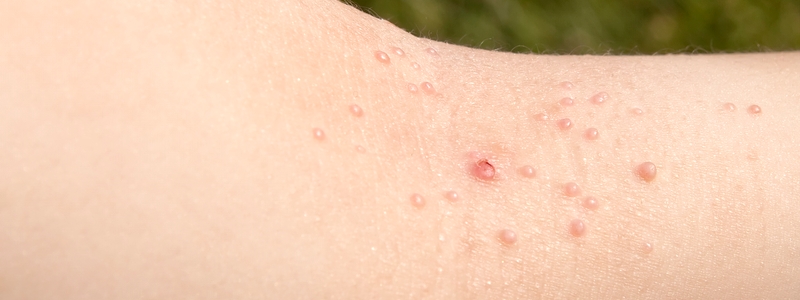Molluscum Contagiosum
Tips For Managing Molluscum Contagiosum
Molluscum Contagiosum bumps, as the name suggests, are very contagious.


Molluscum Contagiosum rarely causes pain and will eventually clear on its own if you have a healthy immune system. They may go away without a trace, but this takes time, during which they can spread. On average, the bumps clear in 6-18 months without treatment. Sometimes, this takes longer and they can re-occur.
Avoid spreading molluscum to other parts of your body by:
- Avoid scratching and picking at the bumps. Scratching and picking can spread the virus to other parts of your body. If your skin breaks open, you are more likely to get an infection. This can be painful and require treatment.
- Treat the molluscum bumps if your dermatologist recommends doing so. If you try to remove the bumps on your own or squeeze out the fluid inside, you risk spreading the virus to other parts of your body, infection and scaring.
- Keep the bumps clean and wash your hands after touching the molluscum. Washing your hands helps to remove the virus and prevents you from your re-infecting other areas of your skin.
- Use 2 towels when drying off. When you or your child has molluscum, it helps to use 2 clean towels to dry off. You’ll use one towel to dry the skin with molluscum. Use the other clean towel to dry the skin without molluscum. This approach helps to reduce the risk of spreading the virus to other parts of the body. Use new, clean towels after each body washing.
- Skip shaving skin with molluscum bumps. Shaving can spread molluscum to other areas of your body. If you must shave the skin with molluscum, use two razors. Shave the skin with molluscum with one razor. The other razor you’d use to shave the skin without molluscum. One could also consider laser hair removal.
- Postpone electrolysis while you have molluscum bumps on your skin. Electrolysis can spread the molluscum from one area to another.
Until the molluscum bumps go away, take precautions to help prevent spreading the molluscum virus to others. Watch what the American Academy of Dermatology recommends here ... https://youtu.be/klkQ2YcJHaw
Dr. Robinson also recommends:
- Covering the bumps with clothing, a bandage, or medical tape during school or work. This helps prevent spreading the infection to other people. When you won’t be around others and before going to bed, remove bandages and medical tape.
- When a child has molluscum bumps, as the name suggests, this virus is very contagious. You can reduce the risk of another child getting molluscum by: 1) Bathing the children separately, and 2) Using different towels to dry each child.
- Wash your hands thoroughly after you touch your own molluscum bumps (or your child’s). You want to use soap and water, washing for as long as it takes you to sing the “Happy Birthday” song.
- Avoid shared baths, swimming pools, hot tubs, & saunas.
- Cover all molluscum bumps before participating in any sport. High school athletes get molluscum contagiosum during sports, such as wrestling, basketball, and football. To prevent spreading molluscum to others:
- Cover all molluscum bumps with clothing or waterproof bandages.
- Avoid sharing gear, such as pads, helmets, and baseball gloves. If it’s likely that a waterproof bandage will come off during a sport and expose someone else to the virus, such as during a wrestling match, stop the sport until the bumps clear.
- Let a child with molluscum sleep alone. It’s easy for the molluscum virus to spread when children sleep together in the same bed.
- Make sure children with molluscum have their own personal items, such as towels, washcloths, bedding, and clothes. This helps prevent spreading the virus from one child to another.
- Stop sharing personal items. People can get molluscum from skin-to-skin contact and when they touch infected items. When the person who has molluscum stops sharing clothes, razors, towels, washcloths, and other personal items, this reduces the risk of spreading the virus to others.
- If molluscum bumps appear in the genital area, stop sexual activity and see a board-certified dermatologist.. In adults, molluscum is often spread through sexual contact — but not always. Treatment is usually recommended for anyone who has molluscum bumps in the genital area (on or near the penis, vulva, vagina, or anus). Your dermatologist can tell you when you can have sexual activity again.
Dr. Robinson offers these tips and others every day to help his patients feel more comfortable in their own skin.




